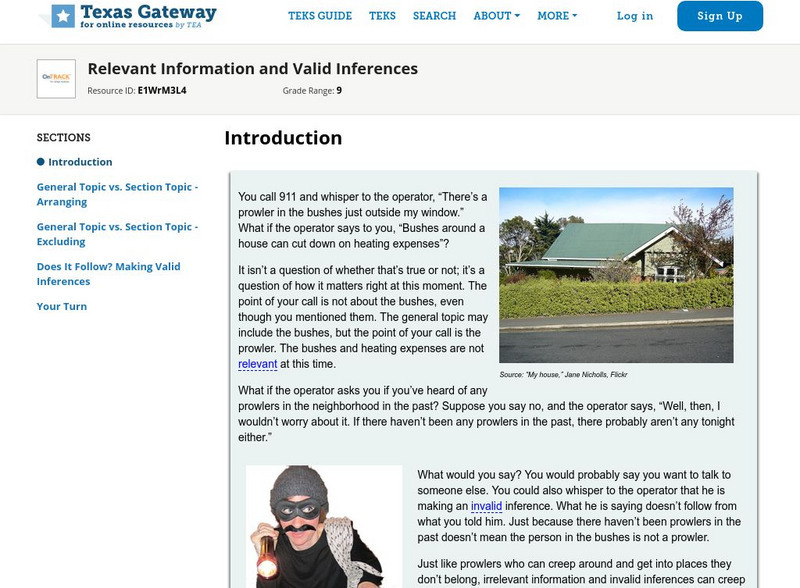EngageNY
Taking Notes Using a Graphic Organizer: Inferring About Work and Play in Colonial America
What was life like in colonial America? Follow this lesson and your pupils will find out what people in colonial times did for work and for fun. Ask learners to compare and contrast the two texts and explain what the reading helped them...
EngageNY
End of Unit 1 Assessment: Inferring and Synthesizing (From Two Texts) About Life in Colonial America
Close your colonial America unit with a performance-based assessment. Class members will show their proficiency in several skills including using details to back up inferences, determining the meaning of words in context,...
EngageNY
Learning About Farms in Colonial America: Explicit vs. Inferred Information
Aid your pupils in understanding the terms explicit and inferred while teaching them about colonial farmers. The third activity in the module builds off the previous activity and focuses heavily on inference. Learners analyze a...
EngageNY
Discovering the Topic: Inferring and Confirming Using Evidence
Allow your class to figure out what they will be studying through an inquiry-based anticipatory set that involves analysis of mystery documents and practice with making inferences. The lesson plan document includes a detailed description...
Roald Dahl
Fantastic Mr. Fox
A fancifully illustrated guide to Roald Dahl's Fantastic Mr. Fox, this series of lessons, activities, and tasks could be used in its entirety or picked apart and used piecemeal. Have young readers investigate the role of dialogue in...
EngageNY
End-Of-Unit 2 Assessment: On-Demand Analytical Essay About How Esperanza Changes Over Time
Close the unit on Esperanza Rising with an in-class analytic essay on how Esperanza changes over the course of the novel. Writers can use any of their notes and work from the unit as well as their drafts of the first two paragraphs of...
EngageNY
Paragraph Writing, Part II
Come up with a list of requirements for this expository essay on Esperanza's character in Esperanza Rising as a class and use the list to guide class writing. Here, learners will complete the first paragraph, discuss their notes for the...
EngageNY
Paragraph Writing, Part 1: How Esperanza Responds on the Train (Revisiting Chapter 5: "Las Guayabas/Guavas")
When your class members have completed the novel Esperanza Rising, they will be ready to write an expository essay on how Esperanza responds to events and what this says about her character. Set your pupils up for success by starting out...
EngageNY
Writing, Critique, and Revising: Two-Voice Poems (Chapter 14: "Las Ucas/Grapes")
Continue work on the two-piece poem that compares two characters from Esperanza Rising. Give class members a few minutes to finish their drafts. After they have a complete product, model how to critique and edit the poems with one group....
EngageNY
Gathering Evidence and Drafting a Two-Voice Poem (Chapter 13: "Los Duraznos/Peaches")
Begin class with a short comprehension quiz and review and then move into a new genre: two-voice poems. The activity provides information about this type of poetry as well as a video example made by eighth graders that you can show your...
EngageNY
Contrasting Perspectives: Should the Farmworkers in Esperanza Rising Go On Strike? (Chapter 12: "Los Esparragos/Asparagus")
Explore multiple perspectives through a jigsaw activity that will improve your pupils' understanding of the characters in Esperanza Rising as well as their understanding of strikes and human rights. Tapping into prior knowledge, and...
EngageNY
Characters Changing Over Time (Chapter 10: "Las Papas/Potatos")
Engage further in Esperanza Rising with a focus on close reading and metaphor. Class members zero in on the tenth chapter, examining characters and big ideas. Pupils discuss the text in small groups and as a whole class, and participate...
EngageNY
Inferring About Characters Based on How They Respond to Challenges (Chapter 4: "Los Higos/Figs")
How do you know what a character's personality is like if an author doesn't tell you? With a focus on character development in Esperanza Rising, pupils complete a jigsaw activity to analyze the actions of Mama, Abuelita, and Miguel. Once...
EngageNY
Inferring About Characters Based on How They Respond to Challenges (Chapter 3: "Las Papayas/Papayas")
Start off your day with a quick reading comprehension quiz about chapter three of Esperanza Rising by Pam Muñoz Ryan. After they complete the quiz, pupils participate in a discussion and look closely at the text. A strong Common Core...
EngageNY
Getting to Know Esperanza (Chapter 2: “Las Uvas/Grapes”)
Delve into Esperanza Rising by Pam Muñoz Ryan with close reading and evidence-based, text-dependent questions. Part of a unit series, this well-sequenced, Common Core designed instructional activity draws on material from the previous...
Teacher's Corner
Is There a Wocket in my Pocket?
Accompany Dr. Seuss' Is There a Wocket in my Pocket? with this graphic organizer. Young readers make inferences about why the main character has certain feelings towards the creatures found in the story.
Curated OER
Rudyard Kipling's "Rikki-Tikki-Tavi": Mixing Fact and Fiction
"Rikki-Tikki-Tavi," from The Jungle Book, offers young readers a chance to examine how Rudyard Kipling uses setting and personification to bring to life the brave mongoose who battles cobras to protect his family. Class members explore...
Other
Into the Book: Inferring: Using the Clues
Watch an introductory tutorial about inferring during reading, and then choose from several different types of texts to practice using the skill.
Curated OER
Mc Graw Hill: Part 2 Reading: Informational Text: Quote Accurately
Learn about quoting accurately and making inferences on this site. A link provides a model with text and supported inferences.
Other
Peoples Education: Make Inferences in Science [Pdf]
This online textbook selection focuses on how scientists make inferences from evidence. Students are given a reading passage about underwater exploration and are asked to make inferences based on the text. The passage is followed by...
Texas Education Agency
Texas Gateway: Descriptive vs. Comparative Investigations
In the following lesson students will learn the differences between descriptive and comparative investigations.
Reading Rockets
Reading Rockets: 103 Things to Do Before/during/after Reading
The highly-respected Reading Rockets program offers both teachers and students a toolkit of ways to connect more actively with the materials they read. Some of these techniques are specifically for fiction-reading, others are designed...
Texas Education Agency
Texas Gateway: Understanding Drama
You will learn how to make complex inferences in a play and use textual evidence to support your understanding.
Texas Education Agency
Texas Gateway: Relevant Information and Valid Inferences
[Accessible by TX Educators. Free Registration/Login Required] You will be able to write an essay that contains relevant information and valid inferences. W.9-10.2 Informative





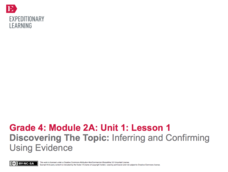



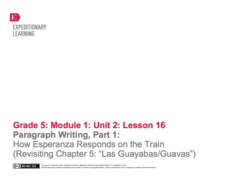



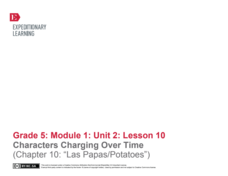

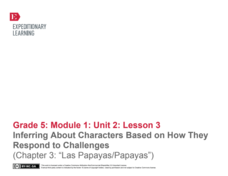





![Peoples Education: Make Inferences in Science [Pdf] eBook Peoples Education: Make Inferences in Science [Pdf] eBook](https://d15y2dacu3jp90.cloudfront.net/images/attachment_defaults/resource/large/FPO-knovation.png)



